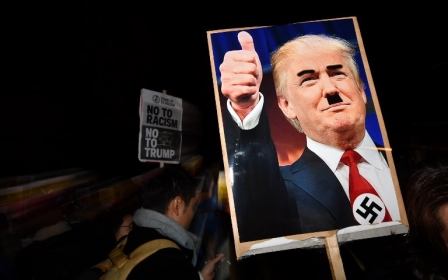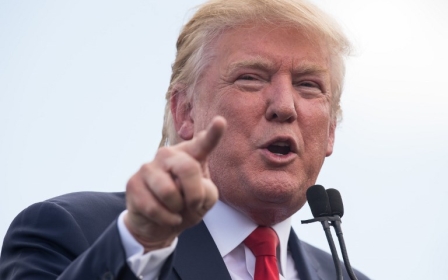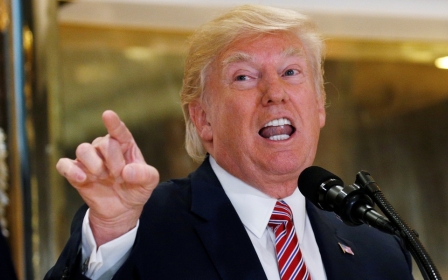Trump fires adviser Steve Bannon
President Donald Trump fired chief strategist Steve Bannon on Friday, the White House announced, ending the turbulent tenure of a rabble-rousing conservative media entrepreneur and political activist who was a darling of Trump's base.
"White House Chief of Staff John Kelly and Steve Bannon have mutually agreed today would be Steve's last day," White House spokeswoman Sarah Sanders said in a statement. "We are grateful for his service and wish him the best."
A source familiar with the decision, which had been under consideration for a while, said Bannon had been given an opportunity to depart on his own terms. "The president made up his mind on it over the past couple of weeks," the source said.
Kelly had been evaluating Bannon's role within the White House. "They gave him an opportunity to step down knowing that he was going to be forced to," the source said.
The departing White House chief strategist was the head of far-right news website Breitbart, which has been a platform for an ideology that promotes white identity and rejects multiculturalism and immigration, according to the Anti-Defamation League, a Jewish American civil rights group.
'One less white supremacist'
Democrats cautiously welcomed Bannon's departure.
"There is one less white supremacist in the White House, but that doesn't change the man sitting behind the Resolute desk," Democratic National Committee spokesman Michael Tyler said in a statement, referring to Trump's Oval Office desk.
"Donald Trump has spent decades fueling hate in communities, including his recent attempts to divide our country and give a voice to white supremacists."
Bannon, who has been a leading figure in shaping Trump's nationalistic policies, has been accused of white supremacy and anti-Semitism, charges that he denies. His backers cite his support for Israel to deflect claims of anti-Semitism.
Bannon co-founded Breitbart Jerusalem, a section of the website dedicated to covering the Middle East from an "unabashedly Zionist perspective".
After confrontations between neo-Nazis and counter-protesters in Charlottesville, Virginia last weekend, Bannon's role in the White House came under scrutiny.
Trump has been fiercely criticised by Democrats and Republicans for blaming "both sides" for the violence.
After a rally for white supremacists on 12 August, the National Association for the Advancement of Colored People called on Trump to fire Bannon.
Bannon has been called by various media reports the "architect" of Trump's "Muslim ban", which aims to ban citizens of seven Muslim-majority countries from entering the United States.
He has already returned to Breitbart as executive chairman and headed an editorial meeting for the website on Thursday evening.
He damaged his standing by giving an interview to the liberal American Prospect this week in which he was seen to be undercutting Trump's position on North Korea.
Bannon told associates he thought he was talking to an academic in an off the record conversation.
Casualties mount in White House
Bannon is the latest official to be forced out of the White House in Trump’s tumultuous seven months in office.
National security adviser Mike Flynn, press secretary Sean Spicer, chief of staff Reince Priebus and communications director Anthony Scaramucci have all resigned or been fired by Trump amid scandals and infighting within the administration.
Flynn was fired in February after it became public that he had discussed Russian sanctions in a phone conversation with Moscow's ambassador in Washington in 2015. Spicer resigned in protest of Trump’s decision to hire Scaramucci as communications director. Priebus was also terminated after Scaramucci accused him of leaking information to the media.
The communications director lasted 10 days on the job; he was fired after giving an expletive-laden interview in which he criticised both Priebus and Bannon.
Other casualties of the first seven months include Derek Harvey, Middle East adviser on the National Security Council; early communications director Mike Dubke; KT McFarland, deputy national security advisor; Katie Walsh, Priebus's deputy chief of staff; Craig Dear, National Security Council western hemisphere affairs director, and Angela Reid, White House chief usher.
Trump, however, has repeatedly insisted that the White House is not in chaos.
New MEE newsletter: Jerusalem Dispatch
Sign up to get the latest insights and analysis on Israel-Palestine, alongside Turkey Unpacked and other MEE newsletters
Middle East Eye delivers independent and unrivalled coverage and analysis of the Middle East, North Africa and beyond. To learn more about republishing this content and the associated fees, please fill out this form. More about MEE can be found here.




